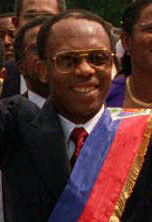A Quote by Raoul Peck
I never considered myself as somebody in exile because, different to my father who, yes, was in exile because he left Haiti as an adult, for me it was just to be somewhere else. I carried Haiti with me everywhere, but I also carried, you know, my youth in a public school in Brooklyn. It's part of who I am as well.
Related Quotes
I'm able to lead my life as well as make a film. My wife and my friends and people around me know that I do tend to distance myself a little bit during the making of a film, but I have to, it's a natural part of the process for me because you are indulging in the headspace of somebody else, you are investing in the psychology of somebody else and you are becoming somebody else, and so there isn't enough room for you and that somebody else.
There is this split between the Haiti of before the earthquake and the Haiti of after the earthquake. So when I'm writing anything set in Haiti now, whether fiction or nonfiction, always in the back of my mind is how people, including some of my own family members, have been affected not just by history and by the present but also by the earthquake.
Probably all of us, writers and readers alike, set out into exile, or at least into a certain kind of exile, when we leave childhood behind...The immigrant, the nomad, the traveler, the sleepwalker all exist, but not the exile, since every writer becomes an exile simply by venturing into literature, and every reader becomes an exile simply by opening a book.
You can't just make yourself matter and then die, Alaska, because now I am irretrievably different, and I'm sorry I let you go, yes, but you made the choice. You left me Perhapsless, stuck in your goddamned labyrinth. And now I don't even know if you chose the straight and fast way out, if you left me like this on purpose. And so I never knew you, did I? I can't remember, because I never knew.
If any country was a mine-shaft canary for the reintroduction of cholera, it was Haiti - and we knew it. And in retrospect, more should have been done to prepare for cholera... which can spread like wildfire in Haiti... This was a big rebuke to all of us working in public health and health care in Haiti.





































